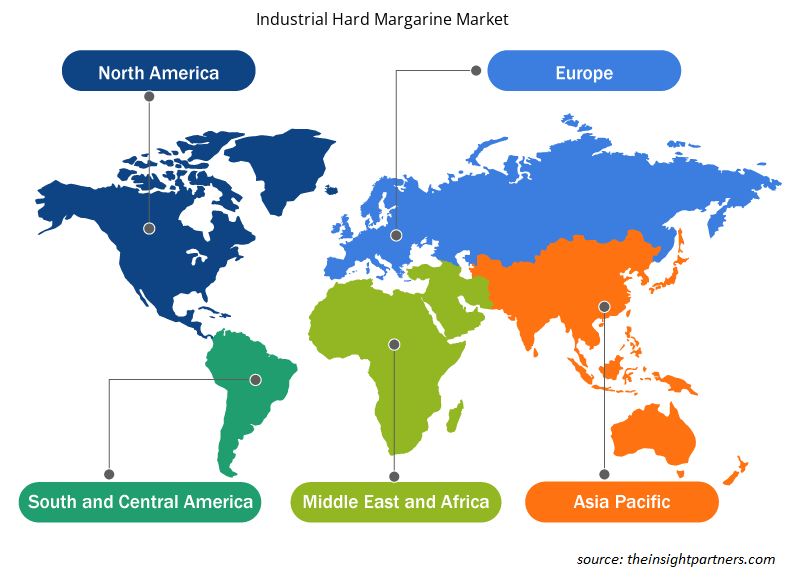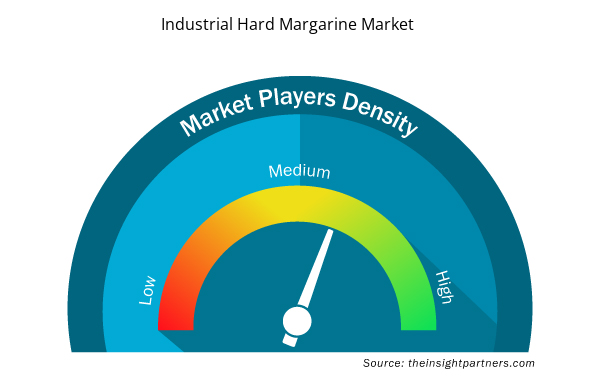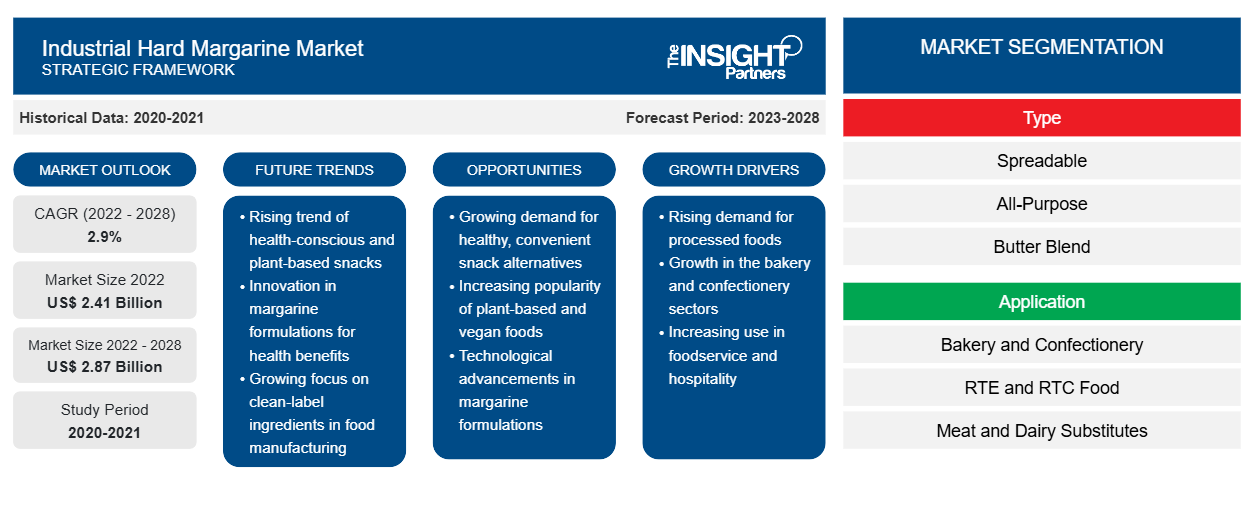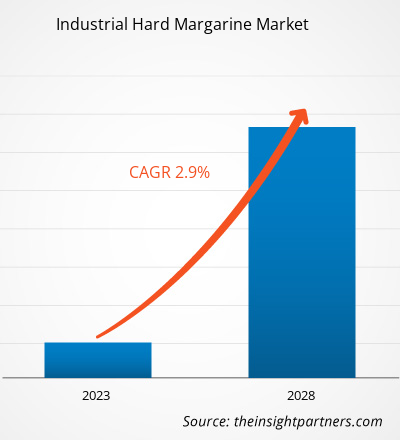工业硬人造黄油市场规模预计将从 2022 年的 24.1451 亿美元增长到 2028 年的 28.6963 亿美元;预计 2022 年至 2028 年的复合年增长率为 2.9%。
人造黄油是通过氢化棕榈油、葵花籽油、菜籽油和红花油等植物油制成的。通常,硬质人造黄油的饱和脂肪酸含量高于其他类型的人造黄油,例如软质/桶装人造黄油和液体人造黄油。食品和饮料行业对烘焙和糖果应用的硬质人造黄油的需求不断增长,极大地推动了市场的发展。此外,由于生活方式的改变和消费者偏好的不断变化,包装烘焙产品的消费量不断增加,这也推动了工业硬质人造黄油市场的发展
2022 年,北美占据了工业硬质人造黄油市场的最大份额。预计在预测期内,亚太地区的市场将以最高的复合年增长率增长。由于糖尿病、高血压和便秘等疾病的发病率不断上升,消费者正朝着健康的生活方式发展,并偏爱具有健康益处的产品。根据美国疾病控制和预防中心 (CDC) 的数据,2021 年美国有 3730 万人患有糖尿病。此外,年轻人对植物性食品的需求也有所增加,这推动了工业硬质人造黄油市场的增长。此外,该地区成熟的食品加工行业使用工业硬质人造黄油来制备多种食品。该地区的主要食品加工制造商正专注于采用低成本的黄油替代品,这导致对工业硬质人造黄油的需求激增。
定制此报告以满足您的需求
您可以免费定制任何报告,包括本报告的部分内容、国家级分析、Excel 数据包,以及为初创企业和大学提供优惠和折扣
- 获取此报告的关键市场趋势。这个免费样品将包括数据分析,从市场趋势到估计和预测。
COVID-19 疫情对工业硬质人造黄油市场的影响
COVID-19 疫情影响了全球各国的经济和行业。北美、欧洲、亚太地区 (APAC)、南美和中美以及中东和非洲 (MEA) 的封锁、旅行限制和企业关闭阻碍了包括食品和饮料行业在内的多个行业的增长。制造部门的关闭扰乱了全球供应链、制造活动、交付计划以及必需品和非必需品销售。2020 年,各公司的产品交付延迟,产品销量下滑。此外,欧洲、亚太地区 (APAC) 和北美各国政府对国际旅行实施的禁令迫使各公司暂时停止合作和伙伴关系计划。所有这些因素在 2020 年和 2021 年初阻碍了各行业的发展,从而抑制了包括工业硬人造黄油市场在内的各个市场的增长。
作为黄油的低成本替代品,人造黄油的需求不断增长,新兴经济体食品行业对人造黄油的需求不断增长,以及消费者对健康生活方式的热情日益高涨,这些都是推动工业硬质人造黄油市场增长的关键因素。在 COVID-19 疫情爆发之前,工业硬质人造黄油市场也受到烘焙产品消费量增加以及食品制造商对价格合理、可持续和更健康原料的需求不断增长的推动。然而,2020 年 COVID-19 疫情爆发后,各行各业经历了前所未有的挑战,包括全国封锁、贸易禁令和旅行限制造成的供应链限制。供应链中断造成原材料短缺,影响了各种产品的生产和分销,导致价格上涨。
2021年,随着各国政府宣布放松此前实施的限制措施,各经济体纷纷恢复运营,提振了全球市场。此外,制造商获准满负荷生产,这有助于它们克服供需缺口和其他影响。
此外,COVID-19 疫情对工业硬质人造黄油市场产生了长期有利影响,因为食品加工行业由于对加工食品和方便食品的需求不断增长而实现了显着增长。食品制造商越来越多地采用工业硬质人造黄油来代替黄油,以低反式脂肪替代品推动了市场增长。由于 COVID-19 患者数量的增加,消费者倾向于健康的生活方式并更多地采用健康食品选择。由于 COVID-19 疫情,消费者越来越关注自己的健康和保健。此外,市场对使用高清洁成分的食品的需求增加,这促进了工业硬质人造黄油的销售。随着消费者在疫情期间越来越关注寻找更健康的替代品,全球对工业硬质人造黄油的需求也在增长。
市场洞察
主要参与者的战略发展有利于工业硬人造黄油市场的增长
2022 年 6 月,AAK AB 收购了以 aquafaba 为燃料的植物基“黄油”品牌。A:黄油:它可以作为乳制品黄油的 1:1 替代品。此外,2021 年 6 月,邦吉 (NYSE: BG) 的植物基脂质业务 Bunge Loders Croklaan 宣布计划在阿姆斯特丹港建造一个最先进的可持续生产设施。市场主要参与者的此类战略发展预计将在未来几年推动工业硬人造黄油市场的增长。
类型洞察
根据类型,工业硬质人造黄油市场细分为可涂抹、通用和黄油混合物。通用部分在 2022 年占据了最大的市场份额,而可涂抹部分预计在预测期内将实现最高的复合年增长率。可涂抹人造黄油是一种软桶人造黄油,与块状人造黄油相比,氢化油更少,液态油更多。它通常由植物油组成。人造黄油涂抹酱有多种用途,从即食产品(如吐司三明治和蛋糕)到海绵生产。制造商提供不同脂肪含量的可涂抹人造黄油,分为高脂、中脂、低脂和极低脂涂抹酱。低脂和极低脂涂抹酱是为即食产品应用而开发的。工业硬质人造黄油市场正在见证几种趋势,包括调味涂抹酱、减肥涂抹酱和均衡涂抹酱的发展。
工业硬质人造黄油市场区域洞察
Insight Partners 的分析师已详细解释了预测期内影响工业硬质人造黄油市场的区域趋势和因素。本节还讨论了北美、欧洲、亚太地区、中东和非洲以及南美和中美洲的工业硬质人造黄油市场细分和地理位置。

- 获取工业硬人造黄油市场的区域特定数据
工业硬质人造黄油市场报告范围
| 报告属性 | 细节 |
|---|---|
| 2022 年市场规模 | 24.1亿美元 |
| 2028 年市场规模 | 28.7 亿美元 |
| 全球复合年增长率(2022 - 2028) | 2.9% |
| 史料 | 2020-2021 |
| 预测期 | 2023-2028 |
| 涵盖的领域 | 按类型
|
| 覆盖地区和国家 | 北美
|
| 市场领导者和主要公司简介 |
|
工业硬人造黄油市场参与者密度:了解其对业务动态的影响
工业硬质人造黄油市场正在快速增长,这得益于终端用户需求的不断增长,而这些需求又源于消费者偏好的不断变化、技术进步以及对产品优势的认识不断提高等因素。随着需求的增加,企业正在扩大其产品范围,进行创新以满足消费者的需求,并利用新兴趋势,从而进一步推动市场增长。
市场参与者密度是指在特定市场或行业内运营的企业或公司的分布情况。它表明在给定市场空间中,相对于其规模或总市场价值,有多少竞争对手(市场参与者)存在。
在工业硬人造黄油市场运营的主要公司有:
- 范德莫特勒 NV
- 邦吉公司
- 焙乐道
- NMGK集团公司
- 不二制油株式会社
免责声明:上面列出的公司没有按照任何特定顺序排列。

- 获取工业硬人造黄油市场顶级关键参与者概览
应用程序洞察
根据应用,工业硬人造黄油市场细分为烘焙和糖果、RTE 和 RTC 食品、肉类和奶制品替代品等。烘焙和糖果部分细分为曲奇和饼干、蛋糕、酥皮糕点和其他烘焙和糖果。烘焙和糖果部分在 2022 年占据最大市场份额,预计在预测期内将实现最高复合年增长率。人们购买力的增加和饮食习惯的改变导致烘焙和糖果产品在群众中越来越受欢迎。饼干等烘焙产品占全球烘焙产品总量的很大份额。烘焙行业包括蛋糕、泡芙、冷冻烘焙产品等。硬人造黄油是一种不可或缺的烘焙原料,因为它可以提供柔软度、改善的质地和更好的感官特征,并提高食品的营养价值。
Vandemoortele NV、Bunge Ltd、Puratos NV、NMGK Group of Co、Fuji Oil Co Ltd、Wilmar International Ltd、Nubeser Soluciones SLU、Cardowan Creameries Ltd、AAK AB 和 Eccelso Ltd 是工业硬质人造黄油市场的主要参与者。这些公司主要专注于产品创新,以扩大其市场规模并追随新兴趋势。
报告亮点
- 工业硬质人造黄油市场的渐进式行业趋势可帮助企业制定有效的长期战略
- 发达国家和发展中国家市场参与者采用的业务增长战略
- 2022 年至 2028 年市场定量分析
- 全球工业硬质人造黄油需求量估计
- 波特五力分析说明工业硬质人造黄油市场中买家和供应商的效力
- 了解竞争市场状况的最新发展
- 工业硬质人造黄油市场的市场趋势和前景以及增长动力和限制因素
- 通过强调支撑商业利益的市场策略来协助决策过程
- 工业硬质人造黄油市场不同节点的规模
- 工业硬质人造黄油行业的市场和增长动态的详细概述和细分
- 各地区工业硬质人造黄油市场规模及增长机遇
- 历史分析(2 年)、基准年、预测(7 年)及复合年增长率
- PEST 和 SWOT 分析
- 市场规模价值/数量 - 全球、区域、国家
- 行业和竞争格局
- Excel 数据集



Report Coverage
Revenue forecast, Company Analysis, Industry landscape, Growth factors, and Trends

Segment Covered
This text is related
to segments covered.

Regional Scope
North America, Europe, Asia Pacific, Middle East & Africa, South & Central America

Country Scope
This text is related
to country scope.
常见问题
Based on the application, bakery and confectionery segment is projected to grow at the fastest CAGR over the forecast period. Increasing purchasing power and changing eating habits of people has surged the growth of bakery and confectionery segment.
Margarine is traditionally produced by the hydrogenation of vegetable oils such as palm oil, canola oil, rapeseed oil, and safflower oil. Being a cheaper alternative to butter, it is widely used in the industrial-scale production of bakery products, which may allow manufacturers to lower the prices of their final products. With characteristics that are similar to butter, margarine improves the texture and stability of various bakery products, such as cakes, flaky pastries, cookies, biscuits, and croissants. Moreover, it is convenient to use and has a high shelf life. Margarine has less saturated fat content compared to butter. Moreover, it is free from any animal-derived ingredients. Nowadays, manufacturers are providing margarine that is free of palm oil, which is increasing their appeal among consumers.
North America accounted for the largest share of the global industrial hard margarine market. North America is one of the most significant regions for the industrial hard margarine market owing to consumers are moving toward a healthy lifestyle and preferring products that provide health benefits and well-established food industry.
Based on type, all-purpose segment mainly has the largest revenue share. The growth of the segment is attributed to its characteristic features such as softness, aroma, and creaminess. The ingredients provide the all-purpose margarine with a uniform structure and a smooth crust.
The major players operating in the global industrial hard margarine market are Vandemoortele NV, Bunge Ltd, Puratos NV, NMGK Group of Co, Fuji Oil Co Ltd, Wilmar International Ltd, Nubeser Soluciones SLU, Cardowan Creameries Ltd, AAK AB, and Eccelso Ltd.
Manufacturers are also developing new technologies to launch palm-free margarine with no undesirable flavors. Rapeseed oil and other alternatives to palm oil are associated with various challenges, including intense organoleptic properties, high oxidation potential, and individual processing requirements. In March 2021, Grüninger AG, a Swiss producer of industrial and commercial margarine, developed a new technology to launch palm-free, vegan/vegetarian margarine, in which off-note flavors are effectively masked. The new process developed by Grüninger AG helps in masking the undesirable flavors of palm oil alternatives by using the natural antioxidant derived from rosemary extract. Such new technologies are expected to provide potential growth opportunities to the manufacturers of industrial hard margarine.
Trends and growth analysis reports related to Food and Beverages : READ MORE..
The List of Companies - Industrial Hard Margarine Market
- Vandemoortele NV
- Bunge Ltd
- Puratos NV
- NMGK Group of Co
- Fuji Oil Co Ltd
- Wilmar International Ltd
- Nubeser Soluciones SLU
- Cardowan Creameries Ltd
- AAK AB
- Eccelso Ltd
The Insight Partners performs research in 4 major stages: Data Collection & Secondary Research, Primary Research, Data Analysis and Data Triangulation & Final Review.
- Data Collection and Secondary Research:
As a market research and consulting firm operating from a decade, we have published and advised several client across the globe. First step for any study will start with an assessment of currently available data and insights from existing reports. Further, historical and current market information is collected from Investor Presentations, Annual Reports, SEC Filings, etc., and other information related to company’s performance and market positioning are gathered from Paid Databases (Factiva, Hoovers, and Reuters) and various other publications available in public domain.
Several associations trade associates, technical forums, institutes, societies and organization are accessed to gain technical as well as market related insights through their publications such as research papers, blogs and press releases related to the studies are referred to get cues about the market. Further, white papers, journals, magazines, and other news articles published in last 3 years are scrutinized and analyzed to understand the current market trends.
- Primary Research:
The primarily interview analysis comprise of data obtained from industry participants interview and answers to survey questions gathered by in-house primary team.
For primary research, interviews are conducted with industry experts/CEOs/Marketing Managers/VPs/Subject Matter Experts from both demand and supply side to get a 360-degree view of the market. The primary team conducts several interviews based on the complexity of the markets to understand the various market trends and dynamics which makes research more credible and precise.
A typical research interview fulfils the following functions:
- Provides first-hand information on the market size, market trends, growth trends, competitive landscape, and outlook
- Validates and strengthens in-house secondary research findings
- Develops the analysis team’s expertise and market understanding
Primary research involves email interactions and telephone interviews for each market, category, segment, and sub-segment across geographies. The participants who typically take part in such a process include, but are not limited to:
- Industry participants: VPs, business development managers, market intelligence managers and national sales managers
- Outside experts: Valuation experts, research analysts and key opinion leaders specializing in the electronics and semiconductor industry.
Below is the breakup of our primary respondents by company, designation, and region:

Once we receive the confirmation from primary research sources or primary respondents, we finalize the base year market estimation and forecast the data as per the macroeconomic and microeconomic factors assessed during data collection.
- Data Analysis:
Once data is validated through both secondary as well as primary respondents, we finalize the market estimations by hypothesis formulation and factor analysis at regional and country level.
- Macro-Economic Factor Analysis:
We analyse macroeconomic indicators such the gross domestic product (GDP), increase in the demand for goods and services across industries, technological advancement, regional economic growth, governmental policies, the influence of COVID-19, PEST analysis, and other aspects. This analysis aids in setting benchmarks for various nations/regions and approximating market splits. Additionally, the general trend of the aforementioned components aid in determining the market's development possibilities.
- Country Level Data:
Various factors that are especially aligned to the country are taken into account to determine the market size for a certain area and country, including the presence of vendors, such as headquarters and offices, the country's GDP, demand patterns, and industry growth. To comprehend the market dynamics for the nation, a number of growth variables, inhibitors, application areas, and current market trends are researched. The aforementioned elements aid in determining the country's overall market's growth potential.
- Company Profile:
The “Table of Contents” is formulated by listing and analyzing more than 25 - 30 companies operating in the market ecosystem across geographies. However, we profile only 10 companies as a standard practice in our syndicate reports. These 10 companies comprise leading, emerging, and regional players. Nonetheless, our analysis is not restricted to the 10 listed companies, we also analyze other companies present in the market to develop a holistic view and understand the prevailing trends. The “Company Profiles” section in the report covers key facts, business description, products & services, financial information, SWOT analysis, and key developments. The financial information presented is extracted from the annual reports and official documents of the publicly listed companies. Upon collecting the information for the sections of respective companies, we verify them via various primary sources and then compile the data in respective company profiles. The company level information helps us in deriving the base number as well as in forecasting the market size.
- Developing Base Number:
Aggregation of sales statistics (2020-2022) and macro-economic factor, and other secondary and primary research insights are utilized to arrive at base number and related market shares for 2022. The data gaps are identified in this step and relevant market data is analyzed, collected from paid primary interviews or databases. On finalizing the base year market size, forecasts are developed on the basis of macro-economic, industry and market growth factors and company level analysis.
- Data Triangulation and Final Review:
The market findings and base year market size calculations are validated from supply as well as demand side. Demand side validations are based on macro-economic factor analysis and benchmarks for respective regions and countries. In case of supply side validations, revenues of major companies are estimated (in case not available) based on industry benchmark, approximate number of employees, product portfolio, and primary interviews revenues are gathered. Further revenue from target product/service segment is assessed to avoid overshooting of market statistics. In case of heavy deviations between supply and demand side values, all thes steps are repeated to achieve synchronization.
We follow an iterative model, wherein we share our research findings with Subject Matter Experts (SME’s) and Key Opinion Leaders (KOLs) until consensus view of the market is not formulated – this model negates any drastic deviation in the opinions of experts. Only validated and universally acceptable research findings are quoted in our reports.
We have important check points that we use to validate our research findings – which we call – data triangulation, where we validate the information, we generate from secondary sources with primary interviews and then we re-validate with our internal data bases and Subject matter experts. This comprehensive model enables us to deliver high quality, reliable data in shortest possible time.


 获取此报告的免费样本
获取此报告的免费样本